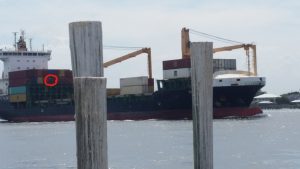
Some time ago an importer in Jacksonville, Florida bought machine product CIF from overseas. For those who are not students of Incoterms, CIF stands for, ‘Cost, Insurance, and Freight’. This means the overseas seller has the responsibility to pay the expense of the inventory, the cargo insurance, and the freight costs for what he sells to the buyer (importer) up until the shipment is delivered to the named port of entry (typically). Normally with this system, the seller’s cargo liability ends at the port of exit once cargo loading is complete, this is where the buyer’s liability begins. What could go wrong?
In the case of the buyer from Jacksonville, FL, the cargo experienced damage during transport. The damage was not enough to write off the machine, but enough to be in the four or five-thousand-dollar range to repair. The buyer was not rattled too much, the seller had provided cargo insurance as CIF dictates. The ‘What could go wrong?’, part did not come until the buyer attempted to file a cargo insurance claim; this is where the train left the tracks. The overseas insurance company was impossible to contact, and the ‘USA based’ claims agent phone number led to an empty office in Seattle, Washington.
For practical purposes, the cargo insurance certificate, issued in a particular subcontinent, was not worth the paper it was printed on. The certificate’s only real purpose was to satisfy the CIF requirement of cargo insurance being provided by the seller. Once the buyer complains to the seller about the damage, the seller can take the position of they fulfilled their CIF obligation and the buyer’s dispute is with the insurance company. In most instances an international lawsuit just is not worth it for four or five thousand dollars. The first step would be finding legal representation in the home country where the defendant is, this can be very costly. The buyer was stuck.
When it comes to being a USA importer, cargo insurance being viable is not a given in a CIF deal. It is not a given because someone else is buying it. I am in no way suggesting all overseas sellers are pirates looking to scam American importers, nothing could be further than the truth. Nonetheless, there is risk of the heartache of trying to deal with a claim filed with an insurer whose claims agent is an empty office in Seattle. One cargo insurance underwriter shared a story with me of an importer who inquired about contingency cover up and above what the seller provided. When the buyer sent a copy of the cargo insurance certificate to the underwriter, it was written in Mandarin! The buyer didn’t have a clue what was covered.
As a CIF an importer, if you can dictate in the terms of sale what insurance company you wish the seller to use, exactly what type of coverage is to be provided, and where they buy it, that will mitigate risk. If you are unable achieve an agreement on controlling selection of cargo insurance while the seller burdens the cost, what can you do short of insuring the shipment and double insuring to protect yourself? Contingency cargo insurance is the option.
Most people in transportation are accustomed to hearing about contingency cargo insurance being used by domestic trucking 3rd parties (brokers). Domestic brokers sometimes hold a contingency policy as a backup in case the trucker’s insurance is not viable. However, there is an international transportation application for contingency cargo insurance.
Contingency cargo insurance is not considered double insuring as it is not primary coverage. Contingency coverage comes into play in instances where the primary insurance is not worthwhile or falls short. Moreover, contingency coverage can be tailored to fill the gap between what the CIF cover the seller provides, and what the buyer would prefer as coverage for a shipment they are at risk for. If the seller provided ICC Clause B or C, or even Clause A heavy on exclusions, contingency cover could fill the gap between what is wanted and what is in hand provided by the CIF seller. Since contingency coverage is secondary, it is very affordable for importers who wish to have the layer of protection.
If you choose to secure contingency cargo insurance coverage for your CIF imports, many of the same rules apply as if you were shopping for primary coverage. First, make sure the insurer is reputable and has an established structure of claims agents in the importers home country. You should also obtain and review a copy of the full terms and conditions your contingency coverage will contain. And lastly, make sure the vendor you are dealing with is established and provides excellent customer service starting with the first contact. If you struggle to get call backs and email replies during the quoting stage, think how bad things will be in the event of a claim.
